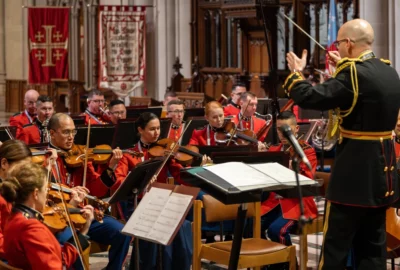
He helped overcome a crucial data challenge for the State Department
The State Department's modernizing program includes a news emphasis on data, what is called, Data for Diplomacy. State gives annual awards to employees who advance...
The State Department’s modernizing program includes a news emphasis on data, what is called, Data for Diplomacy. State gives annual awards to employees who advance the use of data to improve things. Federal Drive with Tom Temin guest was recognized for how he identified challenges in collecting data about foreign assistance. Lenny Lantsman is the Program Advisor in the Bureau of International Narcotics and Law Enforcement Affairs.
Interview Transcript:
Tom Temin First of all, tell us about the Bureau of International Narcotics and Law Enforcement Affairs at State Department. It sounds like a conglomeration of several other agencies. What do you do there?
Lenny Lantsman The International Narcotics and Law Enforcement Affairs Bureau at the U.S. Department of State is, I would call it, the center of gravity for international criminal justice reform around the world. We work with approximately 1.3 to $1.5 billion every year, congressionally appropriated, in, depending on how we count it, between 60 and up to 100 different countries. And the bureau really focuses as its name implies, on an anti-crime and counter-narcotics mission. But over the years and INL has actually been around since the late seventies when it started as narcotics affairs sections at embassies and shifted to be the INL Bureau, I think, in the early nineties. But in many ways, it is a place that thinks about what can we do to support our foreign criminal justice partners from national police agencies, national corrections agencies and down to subnational agencies too. We work with certain country municipal police agencies, but we also work with organizations like public defender organizations. We work with the justice sector, we work with prosecutors. We essentially work across the entire spectrum of the criminal justice system to enable our foreign partners to be better at fighting crime in their jurisdictions so that Americans are less affected by those crimes. And we have a deep and heavy emphasis on a number of critically important things. I would sort of say at the very top, counter-narcotics fighting fentanyl, the manufacturer of precursors, the trafficking of precursor chemicals that are used to make fentanyl is a huge, huge issue for, INL. There’s a lot of effort both to support foreign partners, work with the interagency, our huge partners with Department of Justice, Department of Homeland Security, but also at the multilateral level. And so we work very closely with United Nations and other large multilateral bodies to develop standards not only on fentanyl and precursors, but on a whole range of other areas.
Tom Temin All right. And then you are cited for and I’m going to read here, quote, “pioneering work to identify data collection challenges inherent to foreign assistance programing for the bureau.” So translate that for us as to what you do there on the data front and how that supports the mission.
Lenny Lantsman I was humbled by the nomination and even more surprised by being awarded. I have to say that I’ve been with INL in some capacity or other, I started as a fellow, for over a decade. I’m a comparative criminologist by trade. That’s what my Ph.D. work is in in criminal justice. And so I’ve always brought into the bureau a perspective of what is it that is going to enable our folks and meaning the people who are actually managing the foreign assistance. And again, INL is bureau composed of people who are managing congressionally appropriated dollars to do programs in other countries to again, make their criminal justice systems more effective at fighting crime. I work in a very unique office, and I would say our office is essentially the think tank for the INL bureau. It’s the Office of Knowledge Management, and it’s really the culture of our office that has enabled me to be talking to you now. Right. And the culture of the place that I work in is very much thinking creatively about what kinds of tools can we create to, again, enable our folks within the U.S. government, within INL, to better design and implement effective and efficient program using taxpayer dollars. Some of the things that I work on, and I think that I have been recognized for are thinking about, we can go to a foreign partner and we can say we want your national police to be more effective at, let’s say, fighting crime or we want to reduce incidents of use of force by your police so that you can have better community relationships with communities that you need to work with so that they can give you tips, so you can fight crime and so on. And that police agency can say we actually don’t collect any data or information on our use of force incidents. And so one of the projects that I’ve worked on and I think I’ve been recognized for, is working with the United Nations Office of Drugs and Crime on the development of international, not necessarily standards, because international standards go through, I would say more of a probably like a treaty process to a certain degree where they’re sort of formalized. Instead, I’ve worked with the U.N. on developing international guidelines on the kinds of data that law enforcement, justice and corrections agencies should be collecting so that they know whether they’re actually being effective. And the reason that’s important for INL is that what that project is doing is creating the underlying architecture globally so that when we do turn to that National Police agency and they tell us, we don’t actually collect use of force statistics on who are police officers interact with or the demographics of those people, for example. So we can’t even tell you if use of force by our police are more to certain minorities or ethnic groups more than others. These guidelines are ones that we will be able to point to and say, actually, here’s the international, baseline for what you should be collecting. Let us help you develop that before we even work on developing sort of programs so we can actually then develop programs and know whether they’re being effective or not.
Tom Temin We’re speaking with Lenny Lantsman. He’s program advisor in the Bureau of International Narcotics and Law Enforcement Affairs at the State Department and a recipient of a Data for Diplomacy award. And I guess in many ways you can point to the United States, imperfect as people think our policing is, and nothing is perfect, but we have a lot of data to show what the imperfections might be or where the shortfalls lie. So you’ve got a country that’s a good example. In this case, at least, that must be an advantage.
Lenny Lantsman I’m happy you mention that, because that is exactly in many ways how INL thinks. But part of the job of INL and folks like me is to act as interpreters and translators of the U.S. experience and contextualize it for our foreign partners. One of the ways we do this is we work very closely with a number of state and local partners around the United States that we think are really great examples and potential implementers for some of our programs overseas. We also work very closely with essentially every federal agency that has a law enforcement or anti-crime function. We work with them and employ them as implementers for programs, as trainers, as models for reform and change. I will say that a good example even of the project that I just mentioned to you on developing these guidelines, one of our critical and core partners was the Bureau of Justice Statistics under the Department of Justice. And we turned to them and said, Look, we’re working with the U.N. to develop these international guidelines. We want the good practices of the United States reflected in these. And they were one of the critical and sort of core reviewers of these guidelines to ensure that they were reflective, as you know Tom, of good practice in the United States at the federal level. I’ll say one other thing. I don’t look towards the U.S. as one model. We have depending on who you ask and what time of the day and who’s counting, or over 17,000 different law enforcement agencies in the United States. We don’t have one model. We have 17,000 models. Right. Plus the federal and at the state level. And that is both, it’s a curse, I would say, to a certain degree within the United States, because it’s so hard to create national standards that then all agencies implement. But for INL, it gives us this multiplicity of options to choose from to say, hey, this jurisdiction is doing a really great job on community policing and let’s talk to them and see what it is that they’re doing that can be generalized and universal to some of our foreign partners. And that’s in many ways how INL works. We look to the United States as a just massive well of expertise, but our job is to translate and interpret and find that expertise that has been most relevant overseas.
Tom Temin And it strikes me that what it is you impart to those foreign criminal justice operators might be in turn used by them to maybe spread the gospel of data driven, decision making, data driven program improvement in other areas of their own governments.
Lenny Lantsman That’s also a great example. We work again in dozens of countries around the world, but we don’t work with every single agency within that country. There are congressional limits, for example, on to which agencies and organizations our money can go. There are issues of political will to say, hey, this part of the government really is reform minded and this part is not so reform minded. So we’re going to develop, for example, our programing to work with the reform minded change agents, as we would call them, and use them as exemplars in that government of what you can do when you sort of really advance criminal justice reform. And let’s say it’s a prosecutor’s agency, for example, focused on anti-corruption. It’s not always successful, as you can imagine, foreign assistance work in international criminal justice reform is really, really complex business. That’s what my office exists to help the bureau with. And I would be remiss if I didn’t mention that I’m really just the tip of the iceberg of people in my office that work on these issues. I happen to be recognized, but I have colleagues that work on very complex data projects that I can barely myself understand that are thinking internally, right? Like I work developing these international guidelines. I have colleagues that work on creating internal data architecture so that INL can better understand the impact of our own programs. Right. And how do we collect that information? How do we work with our implementers so that they’re constantly updating information so that we can see, oh, the baseline has changed. We made a. Program to have X number of positive interactions between police and the community and the implementer is showing that it’s increased more than we accounted for. What’s driving that? What’s making that program more effective? Right. In the converse too, we’re not being successful, which is frankly much more important oftentimes to identify than being successful. Again, I would be remiss if I didn’t mention my colleagues in my office that are working on really great and important data projects to help INL better understand its own results as well.
Tom Temin And oversees any particular aha moments that have happened where somebody there gets it.
Lenny Lantsman That’s a great question. I would say actually to answer that, I would bring you back to the example that you mentioned, which is thinking about which of our partners are particularly good at what they do, and then using those partners to be the voice of change in the region. And I think that’s actually to me, the aha moments is when it’s like, wow, these partners have gotten really good at doing their, let’s say, national police reform. And instead of the United States then going to a country in the region saying, hey, let’s recreate this here, let’s use those partners to be models of change. And so because they’re going to speak, sometimes they speak the same language better than we would, and other times the language is not necessarily like linguistic, but it’s the language of change and reform. So, for example, I know that we, INL Colombia has sort of advanced huge amounts over the years, and Colombia is used as a model partner in other countries. And the Colombians will now go and we’ll do capacity building and training in other parts of the region instead of us necessarily going. But they’re imparting that same kind of change that we had worked with them over many years on.
Tom Temin Sounds like you’re really into your work, though.
Lenny Lantsman I love my job. I was recruited into INL as a Ph.D. student years ago, and when I was recruited in, I just never honestly imagined that there was a place for some someone like me, like a comparative criminologist with a focus on maritime security, which was my very initial focus in INL. But over the years, it became very clear like that there is a place for people like me and it’s a great working environment. And I would say INL is also known as the I never leave bureau, and I can count many colleagues who have stayed for a long time just like me. It’s a really it really is a great place to work. And you’re always working on something very interesting.
Copyright © 2025 Federal News Network. All rights reserved. This website is not intended for users located within the European Economic Area.
Tom Temin is host of the Federal Drive and has been providing insight on federal technology and management issues for more than 30 years.
Follow @tteminWFED
Related Stories





